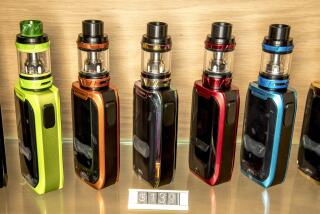E-cigarette maker Juul is said to seek $1.2 billion in funding
Juul Labs Inc., a San Francisco start-up that makes electronic cigarettes, is raising $1.2 billion in a financing round that would value the company at $15 billion, people familiar with the matter said.
Juul plans to use the influx of cash to expand internationally. Outside of the U.S., Juul’s flagship vape pen is available only in Israel, and the company wants to broaden distribution, said one of the people, all of whom asked not to be identified because the company’s plans are private.
Current Juul shareholders include Tiger Global Management and the mutual fund firm Fidelity Investments, according to publicly available disclosures. Juul declined to comment on the funding.
Since launching in 2015, Juul has been a runaway success. Vapers appreciate the flat rectangular product design, discreet size and powerful pre-filled nicotine pods. Sucking on a Juul creates a similar sensation to smoking a cigarette.
As of last month, Juul had captured 68% of the U.S. e-cigarette market, according to Nielsen data compiled in a Juul investor presentation viewed by Bloomberg. The company’s growth has made it a bright spot in an ailing industry. Since January 2017, cigarettes’ share of the smoking and vaping market has fallen by almost 4 percentage points. Juul’s market share has jumped by roughly 3.5 percentage points in the same period.
“Juul’s success underscores the potential for disruptive technology to undermine U.S. tobacco’s reliable business algorithm,” Morgan Stanley analyst Pamela Kaufman wrote in a note to investors this week.
This year alone, tobacco titan Philip Morris International Inc. saw shares slump 23%. Rival British American Tobacco Plc and Japan Tobacco Inc. are down 24% and 15%, respectively. Many tobacco giants have launched their own vaping products, but these have been slower to catch on, according to Nielsen.
Juul says its mission is to help addicted smokers by providing a better alternative to tar-burning cigarettes. Proponents say vaporized tobacco is less harmful than burned tobacco. But Juul has become a controversial investment because vaping is a popular activity among teenagers, sparking a craze in many high schools.
A 2017 study in the American Journal of Medicine found that nonsmoking young adults were four times more likely to start smoking traditional tar-burning cigarettes after about 18 months of vaping. Juul says that you must be 21 years old to purchase its product and that it doesn’t market to teenagers. The company also says it pledged $30 million to fight underage use.
In April, the U.S. Food and Drug Administration said it had asked Juul to disclose documentation related to its marketing strategy to determine whether the company advertised to teenagers. The FDA also asked Juul to provide research about the potential health consequences of vaping.






